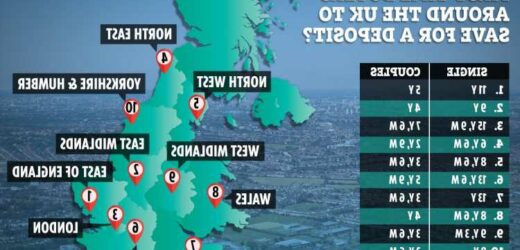FIRST-time buyers across England and Wales face a decade of saving before getting on the property ladder, new research shows.
To put that into perspective, it means a first-time buyer who started saving now could expect to get the keys to their first home in 2029.
Estate agents Hamptons International looked at average wages in each region and house prices to work out how long it would take potential homeowners to save a 15 per cent deposit, if they were putting aside 22 per cent of their salary every month.
It will take savers 10 years and three months on average before coming up with enough cash to own a home.
Unsurprisingly, single prospective buyers in London will have to save the longest, typically for 15 years and nine months.
The North still outstrips the South of England when it comes to affordability, with those in the South East and South West needing to save for at least 13 years before being able to buy a home.
What help is out there for first-time buyers?
GETTING on the property ladder can feel like a daunting task but there are schemes out there to help first-time buyers have their own home.
Help to Buy Isa – It's a tax-free savings account where for every £200 you save, the Government will add an extra £50. But there's a maximum limit of £3,000 which is paid to your solicitor when you move.
Help to Buy equity loan – The Government will lend you up to 20 per cent of the home's value – or 40 per cent in London – after you've put down a five per cent deposit. The loan is on top of a normal mortgage but it can only be used to buy a new build property.
Lifetime Isa – This is another Government scheme that gives anyone aged 18 to 39 the chance to save tax-free and get a bonus of up to £32,000 towards their first home. You can save up to £4,000 a year and the Government will add 25 per cent on top.
Shared ownership – Co-owning with a housing association means you can buy a part of the property and pay rent on the remaining amount. You can buy anything from 25 to 75 per cent of the property but you're restricted to specific ones.
"First dibs" in London – London Mayor Sadiq Khan is working on a scheme that will restrict sales of all new-build homes in the capital up to £350,000 to UK buyers for three months before any overseas marketing can take place.
Starter Home Initiative – A Government scheme that will see 200,000 new-build homes in England sold to first-time buyers with a 20 per cent discount by 2020. To receive updates on the progress of these homes you can register your interest on the Starter Homes website.
That's twice as long as it takes those in the North East where on average buyers are tucking away cash for six and a half years.
In Wales, home buyers need eight years and six months to get on the property ladder.
The latest figures, which are based on the final quarter of 2018, show that things have improved slightly for first-time buyers over the past two years – in 2016 it took an estimated 10 years and nine months to save.
Aneisha Beveridge, head of research at the agency, said: "Saving a deposit is still the biggest barrier to buying a home, but things did improve in 2018.
"Slowing house price growth – which is expected to continue – combined with rising wages, meant that last year it was six months quicker to save for a home than it was two years earlier.
Average house prices in the UK
HERE are average house prices across the UK’s alongside the annual change to December 2018, according to Nationwide Building Society:
– Northern Ireland, £139,599, 5.8 per cent
– East Midlands, £184,283, 4 per cent
– Wales, £156,891, 4 per cent
– Yorkshire and Humberside, £157,436, 3.7 per cent
– West Midlands, £188,163, 2.9 per cent
– North West, £160,984, 2.2 per cent
– South West, £244,304, 2 per cent
– East Anglia, £228,014, 2 per cent
– North East, £125,813, 1 per cent
– Scotland, £147,856, 0.9 per cent
– Outer South East (includes Bedford, Brighton and Hove, Milton Keynes, Aylesbury, Portsmouth and Southampton), £277,117, 0 per cent
– London, £466,988, minus 0.8 per cent
– Outer Metropolitan (includes Reading, Slough, Windsor and Maidenhead and Wokingham), £356,531, minus 1.4 per cent
"However, despite the slight improvement in affordability it still takes a single person more than a decade to save up to buy a home."
Clubbing together with a friend or a partner could help buyers make the leap onto the property ladder much faster, taking around four years and nine months on average, according to the calculations.
Regionally, a couple in London saving together could gather a deposit in seven years and six months on average.
A couple saving in the North East of England could take two years and nine months on average to raise a 15 per cent deposit.
That's what two mates Toby Hambly, 25, and Sam Bennett, 26, from Oxford did after realising that they couldn't get a mortgage on their own.
First-time buyers
HOUSE THATFirst-time buyers could be missing out on £32,000 bonus from the government
Six homes you can buy with a £5,000 deposit or less
I'm a property expert – 20 things to check when buying that could save thousands
I'm a mortgage broker and here are my tips for first-time buyers
Twenty years ago, first-time buyers with a 15 per cent deposit was standard but since then wages have stagnated and property prices soared.
Nowadays, you can actually get on the property ladder sooner with just a five per cent deposit – here are the lenders that are offering the best rates.
Some lenders even offer 100 per cent mortgage, as long as your parents are willing to help you out.
These are the £120,000 homes that first-time buyers can afford without putting down a deposit.
Source: Read Full Article







